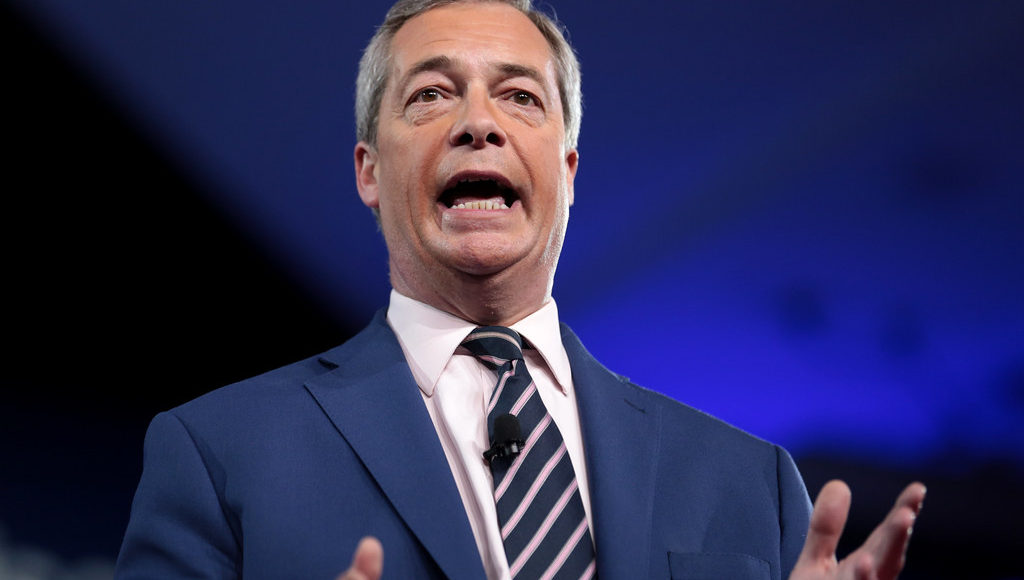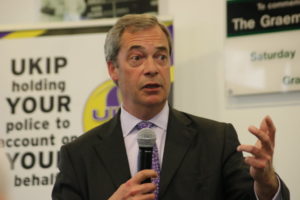Milkshaking Up Activism: the power of humour in resistance
 https://live.staticflickr.com/663/33149364955_02c7a8ecc9_b.jpg
https://live.staticflickr.com/663/33149364955_02c7a8ecc9_b.jpg

Business in Westminster’s parliamentary chambers has been relatively quiet since Brexit Day was postponed to 31 October, rather than taking place on the long-anticipated 29 March. News cycles have momentarily moved away from the United Kingdom, and have taken up activity elsewhere in the world. However, the media spotlight was once again on the UK last week. Attention moved to Nigel Farage, the leader of the newly-formed Brexit Party, as he campaigned for the European elections in Newcastle. More specifically, the focus was on what covered Farage’s navy suit: a milkshake. A man named Paul Crowther had thrown a recently-purchased Five Guys’ Salted Caramel and Banana milkshake on the politician in protest of his actions regarding Brexit as well as his sociopolitical remarks. At the scene, Crowther said, “I didn’t know he [Mr Farage] was in town, I thought this is my only chance… The bile and the racism he spouts out in this country is far more damaging than a bit of milkshake to his front.”
At first, this incident may seem unremarkable or even ridiculous, but, by the afternoon of the same day, #Milkshake was already trending on Twitter. A media frenzy followed, centered on the the evolving circumstances of the incident, allowing this act of protest to become sensationalised quickly. Why? It is because this episode is not an isolated occurrence. It is a part of much broader historical and cultural trends. In a more immediate cultural context, this event is part of a recent wave of “milkshaking” in the UK. Other far-right politicians campaigning for the European elections have been doused in the dairy treat in recent weeks, as part of this unofficial united campaign against political extremism. Tommy Robinson and Carl Benjamin have faced repeated instances of milkshaking due to their inflammatory comments regarding immigration and gender. The trend is believed to have started when Danyall Mahmud joined the group “United Against Fascism” in order to face Robinson at an event in Warrington on 2 May. A confrontation between the two quickly escalated, with racist slurs being thrown at Mahmud by Robinson and his supporters, after which Mahmud dumped his McDonald’s milkshake on the politician. As with Crowther, Mahmud has received a great deal of media attention as a result. Whilst many laud his actions, others have responded with death threats, but he has not received any formal charges.
Just as milkshaking is not unique to Crowther, this form of protest is not unique to milkshakes or even the present day. Protests involving the throwing of food have a long history that stretches back far into the past. The Roman emperor Vespasian was famously pelted with turnips in AD 63 due to his unpopular financial policies. Two more recent forms of this phenomenon have involved eggs and pie as the weapons of choice. Although incidents of this kind have taken place far from the UK, in Australia and the United States, they echo the milkshakings of recent days in many ways. This strategic use of humour has actually been coined “laughtivism.”

March of this year saw the far-right Australian lawmaker Fraser Anning egged by the 17-year-old William Connelly. Connelly, now known as Egg Boy, smashed an egg on the head of the senator after he blamed the Christchurch mosque attacks on the immigration program in place in New Zealand. Anning’s immediate response was to turn and punch Egg Boy in the face. Ultimately, neither received charges, but Anning did face significant public condemnation for his retaliatory actions. Another similar episode occurred halfway around the world in the United States. In September 2016, Kevin Johnson, the mayor of Sacramento, California, took a coconut-cream pie to the face in an act of protest by Sean Thompson. In explaining his actions, Thompson expressed that he believed the mayor was not spending public funds appropriately by allocating it for a new arena instead of for issues relating to public education, community development, or homelessness.
Similarities are interesting, but the value in comparing these incidents is in the differences between them. In the case of Connelly (Egg Boy) and Mahmud, no charges were filed, whilst Crowther faces charges for common assault and Thompson has experienced drawn out legal proceedings. In the case of Crowther and Mahmud, there was no retaliation by the target, whilst both Connelly and Thompson faced physical backlash. Public opinion of the perpetrator and their actions differs widely across these cases as well. Each of the “throwers” received both support and opposition, but in varying balance and intensity. For example, although a Go-Fund-Me was launched for Connelly and raised over $50,000 by those who viewed him as a hero, his own parents were nowhere near as thrilled about their son’s actions. On the other hand, Thompson faced a great deal of criticism for his actions, with a local columnist stating that, “It wasn’t anything but a misguided man carrying out a misguided act for misguided reasons”. In explaining the reason for the differences between these events, it becomes easier to understand what factors in public perception makes political action effective.
A unifying characteristic amongst these situations is that they are viewed as humorous by many onlookers. The difference in this regard is that some incidents are seen as “funnier”, whilst others take on a greater level of seriousness. The source of this variation, and its significance to the effectiveness of political action, can be elucidated using Peter McGraw’s theory on benign violations. McGraw, an expert on emotions and behavioural economics, explained that humour is brought forth by violations of commonly-held norms that are simultaneously deemed acceptable, also known as “benign violations”. Violations are acts that threaten one’s conception of how “the world ought to be,” and come in many forms: from tickling and play-fighting to linguistic violations that occur in puns. Violations are made benign by (1) a lack of commitment to the violated norm, (2) distance from the violation, or (3) an alternative interpretation of the violation, such as that which occurs with tickling. Essentially, humour arises when a disturbance to normality, such as the throwing of food, is forgiven for its “immorality”.
Therefore, the differing reception of the different incidents is linked to the acceptability of the violation in play. The reason why “Egg Boy” and Mahmud may have avoided legal charges and more widespread public condemnation for their actions is because the humour utilised in those two situations constitutes more benign violations. There are a variety of factors that could explain why this is the case. It could be because the target is seen as more deserving. This would depend on what, when, and where a politician made certain comments, and about whom. “Egg Boy” and Mahmud were both responding to racist remarks. “Egg Boy” made his move in the aftermath of the devastating Christchurch terror attack in New Zealand, and Mahmud acted whilst being directly bombarded with racist remarks by the politician in person. Crowther cited racism as his motive as well, but this was not in the context of an international tragedy, and this was not provoked by a direct confrontation where he was personally targeted. In both ways, it is far easier to deem his actions as being uncalled-for and inappropriate. Whether it was a noble act or not, due to the global news context and Crowther’s personal identity, it is more difficult to formulate a concrete justification for his actions other than that he simply felt like it. The same can be said of Thompson. Whilst he expressed that his behaviour was in response to Mayor Johnson’s inaction on homelessness and other issues, there was no broader current-events context or personal stake on the part of Thompson to legitimate his actions as virtuous.

Without a firm normative basis, Crowther and Thompson’s actions fall away from being benign, and more toward the realm of anarchy, with the potential to be harmful rather than harmless. The events surrounding “Egg Boy” and Mahmud involve situational factors, a terrorist attack and a hostile confrontation, that may serve as built-in checks on the protest that followed. The fact that their acts of rebellion were in response to specific incidents of great magnitude prevent their behaviour from being replicated by others in the future unless incidents of equal magnitude arise, in which case that recalcitrant behaviour would be acceptable. The context makes disobedience palatable; the violation is rendered benign. The generalised racism and policy inaction that drove Crowther and Thompson are dangerous because they do not serve as constraints on the milkshaking or pie-ing that followed. Anyone could make those grievances and therefore replicate those disturbances at any time. Unchecked impulse is far more unsettling and less palatable to the public, resulting in malignant violations.
Ultimately, this all reveals that it is not the acts that constitute laughtivism that make it powerful, but rather, power lies in how those acts are received. Context is what separates noble heroism from inconvenient insolence. Once an act of laughtivism reaches the threshold of social acceptability, it puts the target between a rock and a hard place. They are criticised whether they react to the incident or not. In his TED Talk “The Power of Laughtivism”, Srdja Popovic explains that humour and mocking create a huge dilemma for the opponent of a laughtvist, because on one hand, if they react, they will look stupid. However, on the other hand, if they do not react, other people will start mocking them as well. Both action and inaction are made damaging to the target. Mayor Johnson’s use of physical violence against Thompson lacked the public outrage that resulted from similar action taken by Anning against “Egg Boy.” There are multiple reasons that could have played into the differing reception of the two situations, but the specific factors in the acceptability of laughtivism are not as important as the understanding that if it is indeed deemed acceptable, it is highly effective as a form of protest: acceptability and effectiveness go hand-in-hand.
Popovic touches on this effectiveness in his TED talk by determining that humour is an “autocrat’s worst nightmare”, in that it has the potential to melt fear and empower those who use it. Autocrats are typically self-centered and narcissistic individuals, so making fun of them is a blow to the very foundation of who they are. Those characteristics do not just apply to oppressive rulers. Many people, politicians included, exhibit the same personality traits in varying levels. This gives this method of activism great utility in that it derives its effectiveness and potency from inherent human qualities. When an act of laughtivism is deemed a benign violation, it is the subsequent acts by the target that then become unacceptable- whether it is action or inaction. Strategic laughtivists are able to flip the script on those they oppose, by conferring the normative unacceptability of their behaviour onto their target. Whilst powerful, it is clear that these acts come with great deal of risk to those who choose this path. The risk lies in that the proponent of such a method does not know what the public reception of their actions will be. Public sentiment is unpredictable and is highly dependent on a variety of intervening variables. The actions discussed were largely spontaneous with little planning involved. There was likely no long-term agenda put together by Connelly or Mahmud, yet each individual was able to have an impact without receiving charges themselves. The situational factors and public attitude involved were clearly key to these individuals’ success in using humour as activism, so if they were able to have such an impact without first considering the complexity of the environment they were operating in, it can only be imagined how powerful this method could truly be if strategic factors were more heavily analysed prior to action. In a chaotic political realm, laughter is an unassuming yet mighty tool, whose true potential has only just begun to be realised.
Edited by Koji Shiromoto
